September 2012 Newsletter
Welcome to the September 2012 issue of the Global Washington newsletter. If you would like to contact us directly, please email us.
IN THIS ISSUE
- Note from our Executive Director
- Support Global Washington!
- Featured Organization: The Mona Foundation “What is your plan?” Supporting and Learning with Local Educational Initiatives
- Changemaker: Water 1st Partner, COCEPRADIL, and Board President Wilfredo Ramos Ventura Keep the Water Flowing
- Welcome New Members
- Career Center
- Announcements
- Global Washington Events
- Other Events
Note from our Executive Director
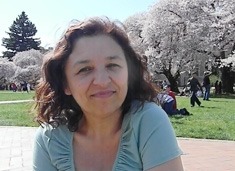 Greetings,
Greetings,
It seems to be the month of the girl! Whether you have daughters who are heading back to school as I do, or you are simply interested in issues affecting girls worldwide—we are offering many ways to support work that benefits girls, engage with the relevant issues, and encourage your children to learn and engage as well.
We are so excited for our event, GlobalFest: Stand for Girls, coming up this Saturday! I really hope to see you all there—this free event will take place at the Seattle Center and we invite the whole community to come and learn about what our member organizations are doing to benefit women and girls around the world. Some highlights: world music by SuperSones and MBOrchestra, GlobalEDU lectures about topics relating to women, inspiring speakers, coupons for free bagels for the first 500 to show up, and the opportunity to meet 40 of our member organizations through interactive booths!
This month, much of our work surrounding this event has been to really highlight the issues affecting women and girls and the organizations that are working on addressing them. The Stand for Girls Campaign is an innovative venture that we launched in partnership with 10 of our member organizations. We are so proud to say that even during a time when many organizations are jealously guarding their funding, these 10 are instead working together to raise money and awareness, recognizing that collectively they can do much more than anyone can do alone! I highly recommend their work and hope that you will consider supporting them by giving our suggested $12 donation (or more!) and then encouraging 12 of your friends to do the same. Together we are more powerful, and we need to work together to make a difference!
Global Washington could also use your support this week! We have been nominated for Chase Community Giving Grant but we need your vote. Please login to Facebook, go to https://apps.facebook.com/chasecommunitygiving/, and search for Global Washington to support us in this way.
Thank you for your support and I hope to see you this Saturday!
In unity,
![]()
Bookda Gheisar, Executive Director
Support Global Washington!
Global Washington has been nominated for a Chase Community Giving Grant! We need YOUR vote to get funded from Chase Community Giving. If you haven’t yet, please VOTE and SHARE with your friends. Voting ends TODAY. Follow the link and search for Global Washington to cast your vote. Thank you for your support—we could not do this without you!
Vote now: https://apps.facebook.com/chasecommunitygiving/ You will need to log into Facebook and accept the application in order to vote.
The Mona Foundation
“What is your plan?” Supporting and Learning with Local Educational Initiatives
By Megan Boucher
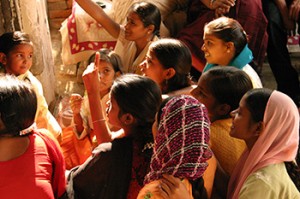
Class at Digital Study Hall, India
Antari was a shy girl who could not even pronounce her own name properly. She dropped out of school three times before she finally enrolled at the Barli Institute for the Development of Rural Women, an educational program for girls that is based in India and supported by the Mona Foundation. After attending the Barli Institute, Antari came back to her village with renewed confidence and skills. She started a tailor shop and went on to receive her Masters of Philosophy in Education. She is now a post-graduate in Hindi literature and works as a teacher in Dahi Village.
The Mona Foundation focuses on two central issues: universal education and raising the status of women and girls. To accomplish this mission, the organization supports grassroots, locally-based programs like the Barli Institute, which has educated over 6,000 women from 500 villages. The Barli Institute provides educational opportunities to rural women, most of whom start the program with little or no reading and writing skills. Within six months, the girls learn to read and write, pass their national exams, and learn a vocation like tailoring. The basis of the project is gender equity. Most graduates return to their villages with the confidence to serve in their local communities. They may teach others to read, teach about healthcare and safe drinking water, or get involved with local governments.
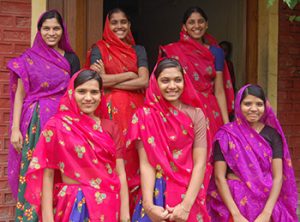
Students from Barli Institute, India
The Mona Foundation was started in 1999 when a small group of friends attended a social economic development conference and become intrigued by the issues presented. During lunch, they met in a little café to brainstorm and doodle ideas for how to address some of the issues presented. “Mona was the result of those doodles on napkins so long ago,” recounts Gaellen Quinn, Mona’s current Executive Director. “I found it inspiring because it would have been so easy for Mona’s founders to say ‘these are great ideas’ and then just go back to their busy lives. But they didn’t.”
The Mona Foundation was formed to support education and empower girls using a model that is highly collaborative and seeks to listen and learn from local communities. Supported programs are all locally operated with a proven record of sustained success. Mona comes alongside them with an attitude of support, providing funding and resources to make the initiatives succeed without imposing an outside agenda.
Quinn described a project in Panama as an example of this model. The Ngobe-Bugle tribes live in the mountains of Panama, isolated from services and the rest of Panamanian society. Their main work is farming and most who live there are extremely poor. However, many among them have a deep value for education. A group of men made a solemn pact with each other, saying “we cannot let our children go on another generation without education.” These men were more educated than many in the community so they started leaving their own farms for periods of time and travelling to remote villages to teach the children there.
The Mona Foundation come alongside the Ngobe-Bugle at this point in their development, and began by providing a stipend to these teachers to make up for the lost income while they were away from their farms. Mona then helped them get teaching credentials so they could be paid as teachers by the government. Finally, Mona provided support as these informal tutorial sessions were consolidated into actual schools.
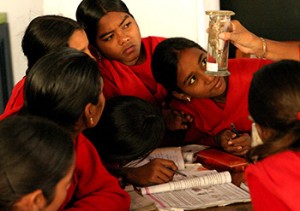
Class at Digital Study Hall, India
Later the Ngobe-Bugle came back to the Mona Foundation saying that they wanted a university. The Foundation was surprised by the ambitious request, but instead of saying no or trying to control the project, they asked the question they always ask their partners: “what is your plan?” The Ngobe-Bugle responded a year later with a detailed plan for the university that they wanted to create. The curriculum would be based in math and science so that their youth would gain the skills needed to conceive and execute economic development projects in their homeland. The Foundation agreed to the project and gained help from Microsoft to build two solar-powered community technology and learning centers so that this remote university could connect with the University of Panama Library remotely.
“The sweetest thing was when they first came back to the Mona Foundation with this big plan for the University,” Quinn recounted of the process of working with the Ngobe-Bugle. “These very humble, very dignified people looked at our board president and said gently and with conviction ‘and this we will do, with or without you.’” Quinn was also impressed when the Ngobe-Bugle later came back to the Foundation and said that things in their villages were changing with education, new roads, and services that had not been available before. They wanted time to reflect on the changing conditions and asked Mona not to give them any more money until they could decide what should come next.
The Mona Foundation’s interactions with the Ngobe-Bugle illustrate how a project is supposed to work—self-directed by the local communities, with Mona coming alongside with an attitude of learning to support existing programs and local visions for the community. “We learn a lot from these folks,” said Quinn. “It’s easy to come in and say how they should do things—but we really don’t know. We could have told them to sell their beautiful embroidery, but that’s not what they wanted. They wanted a university.” And now they have one. Ngabe Bukle Universidad opened its doors in 2007 and is the first-ever indigenous university on native lands in Panama.
Learning is one of the Mona Foundation’s core principles, not only in the programs it supports but also in the organizational ethos. “The world has never achieved a state where poverty and war have been abolished,” explained Quinn. “We don’t know how to do it. Nobody knows how to do it—if we knew how, I think we would do it! But we are all learning and we are all learning together.” Mona seeks to look past what Quinn called the “false dichotomies” between global north and global south, developed nations and underdeveloped nations, and so forth. Such divisions create barriers and inhibit learning.
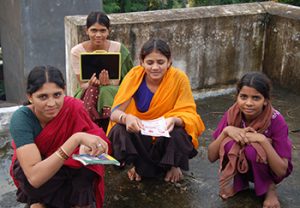
Women at Barli Institute, India
Instead, the Mona Foundation recognizes that we are all developing and we all have much to learn from each other. “This is one of the reasons we really love what you [Global Washington] do and are so happy to come and share,” said Quinn. “Because we know that we don’t know it all!”
The Mona Foundation has achieved much over the years through this attitude of listening and learning. They started with 3 small projects that served 450 children and have grown to support 15 projects in 9 countries that serve over 40,000 children and their families. They also support U.S. programs, especially with minorities or migrant children. One project called Teaching Kids Programming is especially aimed to narrow the technology gap for girls. Teaching Kids Programming will soon start a new project in Hawaii on the Island of Molokai.
Many of the projects that Mona supports have won awards, for instance the Digital Study Hall recently received a Peter F. Drucker award for nonprofit innovation. The Foundation’s Board President, Mahnaz A. Javid, has been nominated for the second time as a finalist for the Microsoft Alumni Foundation Integral Fellows Award Program. But Quinn feels that the organization’s greatest accomplishment is the dedication and collaborative spirit of the organization’s leadership, who epitomize the Mona Foundation attitude of respectful learning. “That’s not something that everyone gets to see so you can’t get an award for it!” laughed Quinn. “But from the inside out it’s great.”
The Mona Foundation’s simple question: “What is your plan?” has sparked excitement, innovation, and vision that is transforming both communities abroad and the Mona Foundation itself. These projects are shining examples of how learning and collaboration can make a real difference for children and communities around the world.
Changemaker
Water 1st Partner, COCEPRADIL, and Board President Wilfredo Ramos Ventura Keep the Water Flowing
By Carolyn Hubbard
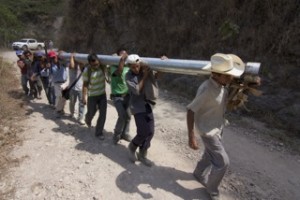 Across rugged terrain in the mountainous region of Lempira, Honduras, men and women carry heavy pipes uphill to a water source, dig trenches for miles, and link and secure each section, forming a long silvery snake through which clean water will flow to kitchens in their homes. Elsewhere, another group replants the heavily deforested land to protect their watershed and this most vital and treasured of resources: water.
Across rugged terrain in the mountainous region of Lempira, Honduras, men and women carry heavy pipes uphill to a water source, dig trenches for miles, and link and secure each section, forming a long silvery snake through which clean water will flow to kitchens in their homes. Elsewhere, another group replants the heavily deforested land to protect their watershed and this most vital and treasured of resources: water.
Honduras is considered the second poorest country in Central America. Unequal wealth distribution and high unemployment, caused from systemic government corruption and economic mismanagement, beset the country of eight million. Lempira Department is one of the most cut-off areas in the country. Bordering El Salvador, it’s mountainous, land-locked, and far away from the urban hub of Tegucigalpa or the touristy coast. Instead some 270,000 people eke out a living from the land. Deforestation is a problem, as is access to clean water.
COCEPRADIL, an acronym for Central Committee for Water and Comprehensive Development Projects in Lempira, has been working for some twenty years to help communities gain access to clean water and sanitation. The Seattle-based organization Water 1st, which offers financial support to community-based organizations focused on the collective development and maintenance of water and sanitation systems within their communities, has partnered with COCEPRADIL. This partnership enables the Honduran organization to continue, even prosper, during some difficult economic times. Wilfredo Ramos Ventura, who will visit Seattle in November to participate in Water 1st’s fundraising event, the Give Water Give Life Benefit, is the board president of the exclusively volunteer-run organization.
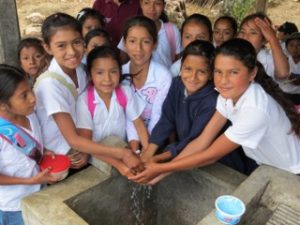 Communities that would like COCEPRADIL to help them gain access to clean water must provide the time and labor. (One recent project serving 300 people took 20,000 hours of hard work.) Two adults from each household in the community must also commit to five weeks of full time training on sanitation and water management. Once the community agrees to these conditions, COCEPRADIL will approve the work. The community then becomes part of COCEPRADIL and participates in community meetings, serves on the board and pays a small water-access bill, the proceeds of which are used to train community members.
Communities that would like COCEPRADIL to help them gain access to clean water must provide the time and labor. (One recent project serving 300 people took 20,000 hours of hard work.) Two adults from each household in the community must also commit to five weeks of full time training on sanitation and water management. Once the community agrees to these conditions, COCEPRADIL will approve the work. The community then becomes part of COCEPRADIL and participates in community meetings, serves on the board and pays a small water-access bill, the proceeds of which are used to train community members.
“Our families are interested in how they are made owners of the source and the micro-watershed to ensure the reforestation and forest conservation in these areas,” Ramos notes. “Families know they have to be in the training workshops after working hours. They understand that this year, they’ll spend more hours a day and more days a week at their jobs, because in addition to the normal work of growing their corn, their beans, their rice, they have to work on the project, two or three days, and besides that, enroll in a training program together and make those changes in attitude.” They know the demands that are going to be placed on them, and, Ramos notes, they love it. The workshops motivate them and the work provides families and communities a sense of cohesion and organization, which in turn provides them the foundation from which to advocate for themselves. “They have organized and gone to the mayor to ask about providing a school, or to say they need a health center, or to show support for the teacher or nurse. They understand clearly that to achieve, you have to be together and speak, as we say here, the same language.”
Born and raised in Lempira, Ramos knows first hand the harsh life that many in the area endure. “I was born into a poor family. My first eight years I walked barefoot. I didn’t have three meals a day. It satisfies me greatly now that my daughters have new opportunities. Growing up, I longed to be able to go to school for longer, but our family situation wouldn’t allow it. What I couldn’t achieve for myself then, I now want others to achieve. We are glad to see a child can laugh because of the improved living standard, that they have access to at least three meals a day, which is a human right. That makes us happy.”
Ramos points out that women benefit greatly from a community’s improved access to water. He recognizes that by not spending the day seeking water, they have more time to be actively involved in community development and are also more respected by their husbands. “The levels of domestic violence are reduced too, thanks to the organizing work we do and how men are becoming more understanding of their wives.”
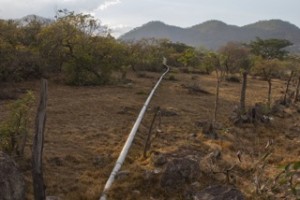 Ramos has only one more year to serve as president, but he’s not going to stop working with COCEPRADIL. He is committed to continuing the work, regardless of the hardship. “We are in this fight to continue improving. Our goal is to satisfy the needs in the Zona Sur South Zone, then the department of Lempira, to have water and sanitation in each house. We are achieving this little by little, but there is still a lot that needs to be done. Unfortunately, the systems are expensive now. Water sources are miles away from the communities, and that prevents us from being able to do things in less time.”
Ramos has only one more year to serve as president, but he’s not going to stop working with COCEPRADIL. He is committed to continuing the work, regardless of the hardship. “We are in this fight to continue improving. Our goal is to satisfy the needs in the Zona Sur South Zone, then the department of Lempira, to have water and sanitation in each house. We are achieving this little by little, but there is still a lot that needs to be done. Unfortunately, the systems are expensive now. Water sources are miles away from the communities, and that prevents us from being able to do things in less time.”
Funding from Water 1st and its private donors has allowed COCEPRADIL to complete projects and help more communities. Speaking on behalf of COCEPRADIL, Ramos notes, “Even though we don’t know these families, who are in our hearts, we are reallly very grateful for the donations that for us, as poor farming families with few economic resources, are invaluable. Without such help, our situation would be very different.”
You can learn more about COCEPRADIL’s work at Water 1st. Check back there for more information on November’s fundraiser and a chance to meet Wilfredo Ramos Ventura. Also check out the Changemaker article about Water 1st’s inspiring executive director in our August 2009 newsletter.
Welcome New Members
Please welcome our newest Global Washington members. Take a moment to familiarize yourself with their work and consider opportunities for support and collaboration!
Educational Empowerment
Educational Empowerment (EE) is dedicated to providing access to an educational environment in Southeast Asia that improves children’s future economic opportunities and affords them fundamental reading skills. http://www.educationalempowerment.org
Lift Up Africa
Lift Up Africa is a US nonprofit with an extensive network of partners and projects in East Africa. We support sustainable, community led projects that address poverty, malnutrition, lack of education and health care, and the impact of climate change on people, crops, animals and the environment. http://liftupafrica.org/
Career Center
Highlighted career
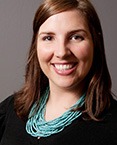 Name and Profile: Abby Stepaniak. Program Officer, International Visitor Program, World Affairs Council
Name and Profile: Abby Stepaniak. Program Officer, International Visitor Program, World Affairs Council
I work with the Department of State’s International Visitor Leadership Program which brings leaders from around the world to the States for professional development and exchange. I work to connect these leaders with their counterparts here in Seattle to foster collaboration, cross-cultural exchange, and open dialogue about the world. More.
Highlighted positions
Northwest Regional Manager, Special Events – Friends of the Orphans
The Director of IVP oversees all program operations and leads a staff of three to successfully execute high-quality, high impact programming for visitors from all corners of the world in a wide array of fields. More.
Northwest Regional Manager, Special Events – Friends of the Orphans
The Regional Manager, Special Events is a full-time exempt employee of Friends of the Orphans and reports to the Regional Director. The Manager will plan and execute successful fundraising events that benefit the work of Friends of the Orphans, including (but not limited to) cultivation events, house parties, gala auctions, one-hour ask events, and events with schools, businesses, and faith communities. The Manager participates fully in activities of the national organization and regional chapter to reach annual revenue goals and the overall strategic goals for the entire organization. More.
Senior Foundation and Corporate Development Specialist – Landesa
The Senior Foundation and Corporate Development Specialist (Senior Specialist) is responsible for performing the full array of activities related to securing revenue from private foundations and corporations. The Senior Specialist will also be asked to perform other appropriate tasks to support the Landesa revenue-seeking and program delivery function. More.
Research Assistant – Landesa
The Research Assistant conducts and documents research and supports the research efforts of others on a variety of topics relevant to Landesa’s work. More.
Highlighted Internships
US GCC Monitoring and Evaluation Internship- Mercy Corps (Portland)
Implement and extend strategy for the upcoming school year to monitor and evaluate education programming at the PDX Action Center and GCC US program. Research and update tools that educators use to monitor programs. Interview relevant staff to understand the needs of the monitoring program. More.
Intern/Volunteer Research Position–Mangrove Action Project
Mangrove Action Project is seeking volunteer or intern help for a project we are planning to conduct as part of our ongoing Question Your Shrimp Campaign. We want to assess the number of restaurants in Seattle that are serving shrimp, or have shrimp on their menus. More.
Highlighted Volunteering Opportunity:
Volunteer – One by One
We currently have volunteer needs in the following areas:
• Office: stuff envelopes (normally we work with Seattle area people who can physically come in a help us)
• Interns with project-specific research, data entry, curriculum development projects
• Website/translating volunteers
• Short/long term projects
• Technical expertise—excited to work with people all over the country, long term (researchers, graphic designers, photographers, film makers, translators). More.
Technology Committee Volunteer- Literacy Bridge
For people who are professional software developers, testers, support staff, and technical writers.
Activities will include:
1) developing, debugging, testing, and documenting the Talking Book’s software
2) providing email technical to support Literacy Bridge’s partners. More.
For more jobs and resources, visit www.globalwa.org/resources/careers-in-development/
Announcements
Why should you attend GlobalFEST on September 22nd?
You’ll meet over 40 organizations that are actively changing the lives of women and girls all over the world. You’ll listen to MBOrchestra’s Middle Eastern music and the Cuban melodies of the SuperSones. And you’ll be invited to a special screening of Half the Sky as well as a series of GlobalEDU lectures on Global Studies, Raising a Global Child, and Secrets to the Development Field’s Job Market. We hope to see as many of you as possible.
Learn more here: http://standforgirls2012.org/
When: Saturday, September 22nd, 2012 11:00am – 4:00pm
Cost: No Charge
Where: The Center House @ Seattle Center
MAP
The Growing Movement of Half the Sky
Filmed in six countries, Half the Sky: Turning Oppression into Opportunity for Women Worldwide follows Nicholas Kristof, Sheryl WuDunn, and celebrity activists America Ferrera, Diane Lane, Eva Mendes, Meg Ryan, Gabrielle Union, and Olivia Wilde on a journey to tell the stories of inspiring, courageous individuals. Half the Sky: Turning Oppression into Opportunity for Women Worldwide is a special presentation of Independent Lens broadcasting on PBS October 1st and 2nd, 2012.
http://www.pbs.org/independentlens/half-the-sky
This month there will be numerous screenings around Washington, including one at Global Washington’s GlobalFest event on September 22nd. Make sure not to miss this film!
Seattle
Saturday, September 22
The Center House at the Seattle Center
12:00pm
A part of Global Washington’s GlobalFest: Stand for Girls Event
Vashon
Tuesday, September 25
Vashon Theatre thanks to GreenTech
6-8 PM, doors at 5:30 PM
Bellingham
Tuesday, September 25
Pickford Film Center
5:30-7:30 PM, doors at 5:00 PM
Clarke Nuber P.S. presents Not-for-Profit Audit and Tax Update: Federal Taxes and Financial Reporting
Please join us on September 20th to hear an update on current trends and changes in federal taxes and financial reporting and accounting for not-for-profits, featuring Jane Searing, CPA and Andrew Prather, CPA. We will discuss: The Other Washington – A Federal Tax Update and Hot Topics in Not-for-Profit Financial Reporting
When: Thursday, September 20th, 2012
8:00am – 10:00am
Cost: $50 (Includes 2 hours of CPE and continental breakfast)
Where: The Meydenbauer Center
11100 NE 6th Street
Bellevue, WA
Who Stole the American Dream?
Looking for plans this Friday? Bill Clapp is recommending this event to all and encouraging you to attend! Author Hedrick Smith is here to explain how the promise of the American Dream- a home of your own, a secure retirement, and a better future for your children- was chipped away through legislative, electoral, and corporate decisions.
When: Friday, September 21st, 2012
Cost: $5
Where: Town Hall’s Lower Level (enter on Seneca Street)
Register: http://townhallseattle.org/hedrick-smith-who-stole-the-american-dream/
Habitat for Humanity’s World House
Habitat for Humanity has built a demonstration home at the Seattle Center to illustrate that affordable housing can be sustainable. Next to the House of the Immediate Future, Habitat has built World House, representative of homes located in other parts of the world. People of different countries use their houses in different ways and Habitat’s house designs reflect these cultural considerations. At the Seattle Center, visitors have the opportunity to tour the World House which contains informational materials on housing locally and globally and can participate in brickmaking as used in homebuilding in parts of the world.
When: Tours available from 1-4 on Saturday, September 22nd, 2012
Where: Seattle Center
Seattle Cultural Exchange Tours
The Pacific Northwest has an exceptional character of its own and these tours are designed to put that unique appeal on display. Travel through three of Seattle’s cultured neighborhoods and enjoy ethnic cuisine, a neighborhood folklore presentation, and a look at economic innovation from that community.
When: Chinatown Discovery- Saturday, September 22nd, 2012
Ballard Cultural Tour- Saturday, September 22nd, 2012
Martin Luther King Business Association Tour- Saturday, September 29th, 2012
Cost: Chinatown Discovery- $40
Ballard Cultural Tour- $21
MLK Business Association Tour- No Charge
Where: Varies by Tour
Tickets for all three tours available on Ticketmaster at these URLs:
Chinatown:
http://www.ticketmaster.com/event/0F004918AC9E3711?artistid=1771868&majorcatid=10005&minorcatid=106
Ballard Cultural Tour:
http://www.ticketmaster.com/event/0F004918B090384F?artistid=1771917&majorcatid=10005&minorcatid=106
MLK Business Association Tour: http://www.ticketmaster.com/event/0F004918A61D34EC?artistid=1771852&majorcatid=10005&minor
Women’s Funding Alliance- Film Series
The Women’s Funding Alliance screened the film Miss Representation last fall to a sold out crowd. Because of unrelenting demand, they are once again screening the film, but this time in three cities across Washington! This three-city effort will kick off a larger film series that will include The Invisible War, and Wonder Women: The Untold Story of American Superheroines. Don’t be left out!
When: Thursday, September 27th, 2012 TACOMA, Grand Cinema
Thursday, October 4th, 2012 SEATTLE, Uptown Cinema
Thursday, October 11th, 2012 KIRKLAND, Kirkland Performing Arts Center
Cost: $10
Get your tickets here today!
http://wfalliance.org/news/actioncinema.php
The Bali Fund honored at upcoming Give2Asia 10 th Anniversary Gala!
The Bill & Pat Bali Fund, a Global Washington member, will be one of the four honorees at the upcoming Give2Asia 10th Anniversary Gala Event. Join hundreds of other Give2Asia partners and community members at the Awards Gala, which will honor outstanding philanthropists who have made a unique impact in Asia with their innovative approaches.
When: Tuesday, October 2nd, 2012 5:15
Cost: $300
Where: InterContinental Mark Hopkins Hotel, San Francisco
Seats are limited for Give2Asia’s 10th Anniversary Awards Gala. The price per seat is $300 and tables of 10 are also available. RSVP here.
MercyCorps, Global Washington, Sounders FC, and Golzao present a film screening of The Beautiful Game
The Beautiful Game is an inspirational documentary about the power of soccer in modern Africa- a game that is helping to change the lives of individuals and communities across the continent. Unlike anything else soccer brings fifty-four diverse countries into a common and passionate dialogue. And the results are tangible: when an African country does well at a competition, its national GDP rises, its exports go up, crime decreases, and political divides narrow. As Reverend Tutu shares in “The Beautiful Game” “soccer isn’t like a religion in Africa. It is bigger than religion”.
This film premiered to a sold-out audience during the SIFF festival in June; and now it’s being brought back to you!
When: Monday, October 8th, 2012 6:30pm
Cost: $5 for preorder and $10 at the door
Where: SIFF Uptown Cinema
Advance tickets available on Brown Paper Tickets!
SIFP: Make a difference, learn, and have fun on October 18th
Social Venture Partners’ second annual Social Innovation Fast Pitch is around the corner. This fast-paced competition was a huge success last year, with more than 700 social innovation enthusiasts voting for their favorite pitch and awarding $5,000 to the winner. This year, 14 groups will compete for more than $150,000 in grants and investments at the Fisher Pavilion, Seattle Center, starting at 4:45pm. Judges, investors, and the audience all participate, and everyone can meet the innovators in the “Poster Table” receptions before and after the event. Global Washington members receive a 10% discount on any ticket by clicking here, until September 30th. To learn more about SIFP, please go to http://sifp.net or visit the event on Facebook. SIFP sold out last year, and is likely to do again, so reserve your ticket now!
When: Thursday, October 18th, 2012 4:45pm
Where:Fisher Pavilion, Seattle Center
ED Forum announces schedule for 2012-2013
The ED Forum is exclusively for Executive Directors and CEOs seeking professional development opportunities, emerging best practices, and information sharing on how to lead nonprofits. Meetings are an informal, fast-paced learning circle where executives rotate among three table discussions, each led by an experienced ED or topic expert. Each participant can share their challenges, experience, and expertise.
When: ED Forums are held on Wednesdays or Fridays from 8:30-10:30am
Friday, October 19, 2012
Wednesday, December 5, 2012
Friday, February 22, 2013
Wednesday, April 24, 2013
Friday, June 21, 2013
Cost: Member Rate*- $18
Non-Member Rate- $25
*Includes Washington Nonprofits, 501 Commons, and Global Washington Members
Where: The 2100 Building
EarthCorps REVIVE – A new kind of party!
This fundraiser/cocktail party soiree is a celebration of EarthCorps’ work. All proceeds go to the EarthCorps leadership program. Guests will enjoy a live auction, international hors d’oeuvres, beer, wine, and inspirational insight into the workings of EarthCorps.
When:Saturday, October 20th, 2012
Cost: $65
Where: The Mountaineers at Sand Point – 7700 Sand Point Way NE – Seattle, WA 98115
RSVP Here: http://www.earthcorps.org/auction.php
MEDRIX Fall Festival Benefit
MEDRIX is hosting an evening benefit in which all donations will support ongoing projects to improve the lives of the people in Southeast Asia. Come hear stories of how projects in medical education and clean water development are having a profound influence on the health and safety of Vietnamese communities.
When: Saturday, November 3rd, 2012 6:00
Cost: $25, or $45 for two
Where: Glendale Golf and Country Club
13440 Main Street, Bellevue, WA 98005
RSVP by October 13th to office@medrix.org or by phone (425) 485-5423.
Video from Landesa- Nutrition and Land Rights
Three of the best minutes you can spend if you want to know how securing land rights helps families to feed themselves! Watch Landesa’s new video and learn more: http://www.youtube.com/watch?v=ie8jBEWdNLQ
Mercy Corps Toolkit for Private Sector Engagement
Engaging with the private sector is one of the most effective means towards the sustainable, market-based change that communities all over the world could benefit from. If you or your organization recognizes this, but aren’t sure how to begin such a partnership, then Mercy Corps could have the perfect tool for you. This comprehensive report details why Mercy Corps chooses its partners, some key programs, and resources utilized by Mercy Corps field teams to ensure that all arrangements with private entities meet their strategic goals.
http://www.mercycorps.org/resources/privatesectorengagement
Red Lotus Technologies
Landmines kill thousands of people each year, over half of whom are children. Over one hundred million landmines scatter the globe, and it is estimated that it will take over 100 years to clear these landmines at the current rate of removal.
A Seattle-based start-up, Red Lotus Technologies, has a new solution to this problem that uses a widely-available and affordable technology: a smartphone. By using smartphones to aid in the detection of landmines, the company’s research has shown that they will increase the speed of landmine removal and increase deminer safety.
Red Lotus Technologies is currently running a fundraising campaign to get its product to Cambodia – support this project or spread the word.
Global Washington Events
Saturday, September 22
GlobalFest: Stand for Girls 2012
Thursday, December 6
4th Annual Conference
Other Events
Friday, September 21
Own It! Celebrating Youth in Global Leadership
Celebrate Ten Years of OWN’s Innovative Leadership!
Saturday, September 22
Women in Innovation Summit 2012
Thursday, September 27
Lumana’s 4th Annual Benefit Dinner and Silent Auction
Friday, September 28
An Intellectual Conversation with Guru Ji
Tuesday, October 2
Diverse Landscapes of Iceland: Photography by Bill Stafford
Thursday, October 4
Announcing the Center for Impact & Innovation!
Jolkona’s Corks and Forks
WFA Film Series: Miss Representation
Friday, October 5 – Sunday, October 7
#SocEnt Weekend: Next 50, October 5-7th!
Wednesday, October 8
Beautiful Game Film Screening
Thursday, October 11
WFA Film Series: Miss Representation
Tuesday, October 16
Financial Management: Best practices for managing your organization`s finances
Into the Devil’s Garden: Whatever Happened to Spanish Sahara? Public Lecture by Leah Farish
Tenth Annual Business of Hope Luncheon
Saturday, October 20
ANNOUNCING REVIVE: A Community Affair!
Sunday, October 21
IEEE Global Humanitarian Technology Conference (GHTC)
Monday, October 22
IEEE Global Humanitarian Technology Conference (GHTC)
Tuesday, October 23
IEEE Global Humanitarian Technology Conference (GHTC)
Wednesday, October 24
IEEE Global Humanitarian Technology Conference (GHTC)
Saturday, October 27
14th Annual Africa Day Business Forum
Sunday, October 28
SAVE THE DATE: Smiles Forever 12th Annual Live-Auction Fundraiser
Editor: Megan Boucher